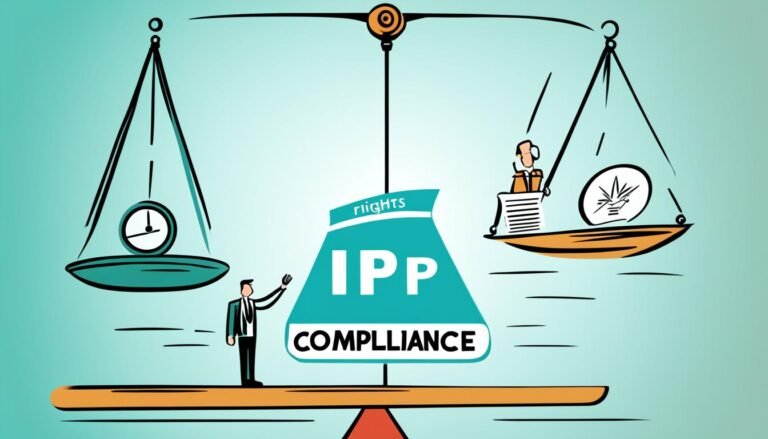Essential Compliance Training Programs for 2023
Did you know that workplace regulation violations can cost companies millions of dollars in fines and legal fees? In today’s fast-paced business world, compliance training has become more important than ever. It helps organizations minimize business risks, ensure a safe and ethical workplace, and avoid potential legal threats. In 2023, there are several essential compliance training programs that organizations should consider implementing to stay ahead.
Key Takeaways:
- Compliance training is crucial for minimizing business risks and avoiding legal threats.
- In 2023, organizations should consider implementing essential compliance training programs.
- These programs cover a wide range of topics, including industry-specific compliance, sales compliance, QA and regulatory compliance, workplace anti-harassment compliance, diversity and inclusivity compliance, data and cybersecurity compliance, health and safety compliance, HR compliance, financial compliance, and corporate governance compliance.
- Integrating compliance training with a learning management system (LMS) provides benefits such as real-time analytics, tracking employee performance, and ensuring data security.
- By investing in compliance training, organizations can promote a culture of ethics and compliance while protecting their reputation and bottom line.
Industry-Specific Compliance Training
Industry-specific compliance training is a critical component of any organization’s compliance program. It focuses on providing employees with the knowledge and skills necessary to navigate the intricacies of their particular industry and meet legal requirements. Whether it’s healthcare, finance, manufacturing, or retail, industry-specific compliance training ensures that employees have a deep understanding of the regulations and best practices that govern their field.
By equipping employees with industry-specific compliance training, organizations can effectively manage risks and avoid potential legal issues. This training helps employees stay up-to-date with the ever-changing regulatory landscape, ensuring that they are well-informed and capable of making informed decisions that align with legal requirements.
Integrating industry-specific compliance training with a robust learning management system (LMS) brings additional benefits. It allows for seamless data flow, real-time analytics, and reporting to track employee performance and compliance. With an LMS, organizations can easily monitor employee progress, identify knowledge gaps, and ensure that training objectives are met.
Benefits of Industry-Specific Compliance Training:
- Enhanced understanding of industry-specific regulations and legal requirements.
- Reduced risk of non-compliance and potential legal consequences.
- Improved ability to identify and mitigate industry-specific risks.
- Increased employee confidence and competence in making compliance-related decisions.
- Enhanced reputation and trust among stakeholders, regulators, and customers.
By investing in industry-specific compliance training, organizations demonstrate their commitment to operating ethically and in accordance with legal requirements. This training not only helps organizations avoid costly penalties and legal battles but also fosters a culture of compliance and ethics throughout the workforce.
Sales Compliance Training
Sales compliance training plays a vital role in guiding businesses to adhere to the rules and regulations governing the sales process. By implementing effective sales compliance training programs, organizations can build trust with customers, mitigate legal issues, and ensure compliance with industry standards such as the General Data Protection Regulation (GDPR) and the Health Insurance Portability and Accountability Act (HIPAA).
Integrating sales compliance training with a robust Learning Management System (LMS) offers numerous advantages to businesses. Firstly, it enables efficient data tracking, allowing organizations to monitor employee progress and identify areas that require improvement. Secondly, an LMS facilitates content management, making it easier to update training materials to reflect evolving sales compliance regulations. Additionally, real-time notifications through the LMS ensure that sales representatives stay informed about any changes or updates in the legal landscape.
One of the key benefits of integrating sales compliance training with an LMS is enhanced data security. As sales teams handle sensitive customer information, it is crucial to ensure that data is protected and compliance is maintained. An LMS can provide secure access to compliance training materials and employ user authentication measures to safeguard valuable data.
“Effective sales compliance training programs are essential for organizations to navigate legal complexities and maintain ethical sales practices.”
Benefits of Sales Compliance Training with an LMS:
- Efficient data tracking and progress monitoring
- Streamlined content management for up-to-date training materials
- Real-time notifications for sales representatives
- Enhanced data security through user authentication
In summary, sales compliance training is essential for organizations to ensure ethical and compliant sales practices. By integrating sales compliance training with an LMS, businesses can effectively track and monitor progress, manage training content, receive real-time notifications, and enhance data security.
| Benefits of Sales Compliance Training with an LMS |
|---|
| Efficient data tracking and progress monitoring |
| Streamlined content management for up-to-date training materials |
| Real-time notifications for sales representatives |
| Enhanced data security through user authentication |
QA and Regulatory Compliance Training
QA and regulatory compliance training are essential components for organizations across various sectors to maintain product quality, customer relations, and legal compliance. Incorporating comprehensive QA compliance measures ensures effective monitoring and stringent testing of product quality, guaranteeing that customers receive products that meet the highest standards. On the other hand, regulatory compliance training ensures adherence to specific laws and regulations relevant to the business, safeguarding against potential legal repercussions.
By combining robust QA and regulatory compliance training programs, organizations can streamline their operations, enhance customer satisfaction, and mitigate risks associated with non-compliance. These training initiatives promote a culture of continuous improvement, where employees understand the importance of maintaining high-quality standards and comply with all relevant regulatory requirements.
Integrating a Learning Management System (LMS) into QA and regulatory compliance training offers several advantages. It allows for continuous monitoring of employee performance, ensuring that they possess the necessary expertise to adhere to quality standards and regulatory obligations. Furthermore, LMS platforms enable organizations to deliver consistent, up-to-date training content, conduct assessments, and track employee progress. The LMS also serves as a centralized repository for training materials, ensuring that sensitive data related to compliance is securely stored and readily accessible.
Benefits of QA and Regulatory Compliance Training:
- Promotes product quality and customer satisfaction
- Ensures legal compliance and minimizes the risk of penalties
- Enhances employee knowledge and expertise in quality assurance and regulatory compliance
- Reduces the likelihood of product recalls or customer complaints due to non-compliance
- Creates a culture of ethics, professionalism, and accountability
At XYZ Corporation, QA and regulatory compliance training are integral to our commitment to delivering exceptional products and maintaining strong customer relations. By investing in comprehensive training programs and integrating them with our robust LMS platform, we ensure that our employees possess the necessary skills and knowledge to uphold the highest standards of QA compliance and regulatory adherence. This commitment enables us to build trust with our customers, protect our brand reputation, and stay ahead of industry regulations.
Organizations that prioritize QA and regulatory compliance training demonstrate their dedication to product quality, customer satisfaction, and ethical practices. By leveraging LMS integration, they can effectively implement and monitor these training initiatives, fostering a culture of excellence and compliance throughout the organization.
| Key Elements of QA and Regulatory Compliance Training | Benefits |
|---|---|
| Comprehensive training on quality assurance methodologies | Ensures consistent adherence to product quality standards |
| Training on industry-specific regulatory requirements | Mitigates the risk of compliance violations and legal penalties |
| Instruction on documentation and record-keeping practices | Facilitates traceability and audit trails for regulatory purposes |
| Integration with quality management systems (QMS) | Streamlines compliance processes and improves efficiency |
| Regular updates on evolving regulatory frameworks | Ensures continuous compliance with changing laws and regulations |
Workplace Anti-Harassment Compliance Training
Creating a safe and inclusive work environment is crucial to ensure workplace anti-harassment compliance. This training program raises awareness about sexual harassment, physical harassment, psychological harassment, and bullying. By educating employees about these issues, companies can reduce the risk of legal complications and safeguard their reputation.
Leveraging Learning Management System (LMS) platforms allows easy access to anti-harassment training modules and integration with HR systems for automated employee data management. With comprehensive training in place, organizations can cultivate a respectful workplace culture and foster an environment where all individuals feel valued and protected.
Benefits of Workplace Anti-Harassment Compliance Training
| Benefits | Description |
|---|---|
| 1 | Reduced risk of legal issues |
| 2 | Protection of company reputation |
| 3 | Increased employee awareness |
| 4 | Improved workplace morale |
| 5 | Enhanced employee well-being |
Investing in workplace anti-harassment compliance training demonstrates a commitment to fostering a respectful and inclusive work culture. By equipping employees with the knowledge and resources to identify and address instances of harassment, organizations can create an environment where everyone can thrive.
Diversity and Inclusivity Compliance Training
Diversity and inclusivity compliance training plays a vital role in fostering a respectful and inclusive work environment. By providing employees with knowledge and understanding of diverse cultures, beliefs, and health conditions, organizations can mitigate bias, discrimination, and ill-treatment at work.
Implementing diversity and inclusivity compliance training helps create a workplace culture that values and respects individuals from all backgrounds. It promotes equal opportunities, encourages collaboration, and enhances employee morale and productivity. A diverse and inclusive workforce brings varied perspectives, creativity, and innovation, contributing to overall organizational success.
Taking advantage of learning management system (LMS) integration offers several benefits in delivering effective diversity and inclusivity compliance training. LMS platforms facilitate the creation of customized training modules that cater to employees’ specific needs and preferences. The use of gamification techniques and interactive content enhances engagement and knowledge retention.
The progress tracking feature of LMS allows organizations to monitor employees’ participation and completion of diversity and inclusivity training, ensuring accountability and compliance. Real-time analytics provide insights into the effectiveness of the training programs and identify areas for improvement.
As organizations continue to prioritize diversity and inclusivity, compliance training in this area remains essential. By embracing diverse cultures, employees can develop cultural intelligence, empathy, and adaptability, contributing to a harmonious and inclusive work environment.
Key Benefits of Diversity and Inclusivity Compliance Training:
- Promotes understanding and respect for diverse cultures
- Reduces bias, discrimination, and harassment at work
- Enhances collaboration and teamwork
- Fosters creativity and innovation
- Improves employee morale and job satisfaction
- Contributes to organizational success and competitiveness
Including employees from diverse backgrounds brings unique perspectives and experiences, enabling organizations to better serve a diverse customer base and navigate global markets effectively. By prioritizing diversity and inclusivity compliance training, organizations demonstrate their commitment to creating a fair, respectful, and inclusive workplace for all.
Data and Cybersecurity Compliance Training
Data and cybersecurity compliance training is crucial in today’s digital age. With the increasing prevalence of cybercrime and data breaches, organizations must prioritize the protection of their sensitive information. This training equips employees with the knowledge and skills necessary to understand and combat hacking, phishing, and other cyber threats.
By educating employees on best practices for preventing unauthorized access and data breaches, organizations can significantly reduce their vulnerability to cyber attacks. Data encryption, user authorization protocols, and regular software updates are among the key measures covered in cybersecurity compliance training.
Moreover, compliance with regulations such as HIPAA (Health Insurance Portability and Accountability Act) and GDPR (General Data Protection Regulation) is of utmost importance to maintain data security and privacy. Through LMS integration, compliance with these regulations can be seamlessly incorporated into training programs, ensuring that employees understand their responsibilities and the consequences of non-compliance.
Overall, data and cybersecurity compliance training plays a critical role in safeguarding organizations against cyber threats and protecting sensitive data. By investing in this training, businesses can create a strong defense against cybercrime and mitigate the risks associated with data breaches.
| Cyber Threats | Training Topics |
|---|---|
| Hacking | Understanding different hacking techniques and how to prevent them |
| Phishing | Identifying and avoiding phishing attempts and email scams |
| Social Engineering | Recognizing social engineering tactics and protecting against them |
| Data Breaches | Implementing measures to prevent unauthorized access and data breaches |
| Compliance Regulations | Understanding and adhering to regulations such as HIPAA and GDPR |
Health and Safety Compliance Training
Health and safety compliance training is crucial for organizations to ensure a safe and healthy work environment, prevent workplace accidents, and comply with legal requirements. This training covers various aspects, including healthcare compliance, OSHA regulations, and workplace safety measures.
Health and safety compliance training plays a vital role in:
- Equipping employees with the knowledge and skills to identify potential hazards and mitigate risks in the workplace.
- Ensuring compliance with legal requirements related to health and safety, such as OSHA regulations in the United States.
- Promoting a culture of safety and reducing the likelihood of workplace accidents and injuries.
- Creating awareness about the importance of personal protective equipment (PPE) and safe work practices.
By implementing comprehensive health and safety compliance training programs, organizations can foster a safer work environment and protect the well-being of their employees. This not only reduces the risk of accidents but also enhances productivity and employee satisfaction.
The Role of OSHA in Health and Safety Compliance
The Occupational Safety and Health Administration (OSHA) is a regulatory body in the United States that sets and enforces health and safety standards in the workplace. Compliance with OSHA regulations is not only a legal requirement but also essential for ensuring the well-being of employees.
Quote: “OSHA regulations play a crucial role in safeguarding workers’ health and safety by setting standards and enforcing compliance in various industries.” – John Adams, Occupational Health and Safety Expert
OSHA compliance training helps employees understand their rights and responsibilities, recognize workplace hazards, and take necessary precautions to prevent accidents and injuries. It covers topics such as hazard communication, electrical safety, machine guarding, and ergonomics.
Online training platforms, such as learning management systems (LMS), provide organizations with a convenient and efficient way to deliver health and safety compliance training. These platforms offer features like personalized learning paths, interactive content, and progress tracking, ensuring that employees receive the necessary training and organizations can monitor compliance.
Implementing health and safety compliance training not only helps organizations meet legal requirements but also demonstrates a commitment to the well-being of employees, fostering a positive work culture.
HR Compliance Training
HR compliance training is essential for organizations to ensure adherence to legal regulations and ethical requirements. It encompasses HR policies and procedures, keeping employees updated on regulatory changes, and promoting compliance with employment laws.
Implementing HR compliance training programs helps organizations mitigate risks, maintain a fair and inclusive workplace, and avoid legal issues. By providing employees with the necessary knowledge and skills, organizations can create a culture of compliance and ensure best practices in HR management.
Benefits of HR Compliance Training
- Minimize legal risks and potential penalties
- Promote a safe and respectful work environment
- Ensure fair employment practices and equal opportunities
- Improve employee morale and engagement
- Enhance HR department efficiency and effectiveness
HR compliance training can cover various topics, including:
- Employment law basics
- Anti-discrimination and anti-harassment policies
- Confidentiality and data protection
- Workplace health and safety regulations
- Employee benefits and compensation
Integrating HR compliance training with a Learning Management System (LMS) offers several advantages:
- Centralized training management and tracking
- Real-time compliance reporting and analytics
- Automated training reminders and notifications
- Seamless integration with other HR systems
- Customized training modules based on job roles
Organizations that prioritize HR compliance training demonstrate their commitment to ethical practices, legal compliance, and employee well-being. By investing in comprehensive training programs, organizations can establish a strong foundation for HR compliance and foster a positive work environment.
| Key Topics | Training Objectives |
|---|---|
| Employment law basics | Ensure employees understand their rights and responsibilities under labor laws |
| Anti-discrimination and anti-harassment policies | Promote a respectful and inclusive workplace, preventing discrimination and harassment |
| Confidentiality and data protection | Protect sensitive employee and company data, maintain confidentiality |
| Workplace health and safety regulations | Ensure compliance with health and safety regulations to prevent workplace accidents |
| Employee benefits and compensation | Provide information on employee benefits, compensation, and entitlements |
Conclusion
Compliance training plays a crucial role in ensuring workplace regulation and employee certification. By implementing a comprehensive set of compliance training programs, organizations can enhance their compliance efforts and promote a culture of ethics and adherence to regulations.
Industry-specific compliance training equips employees with the knowledge and skills specific to their field, ensuring legal requirements are met and risks are effectively managed. Sales compliance training helps businesses navigate legal issues and build trust with customers by following sales process rules and regulations.
Other essential compliance training programs include QA and regulatory compliance, workplace anti-harassment compliance, diversity and inclusivity compliance, data and cybersecurity compliance, health and safety compliance, HR compliance, financial compliance, and corporate governance compliance. Integrating these programs with a Learning Management System (LMS) offers advantages such as real-time analytics, data security, and personalized learning experiences.
By investing in compliance training and leveraging LMS integration, organizations demonstrate their commitment to creating a safe and compliant work environment. With a well-rounded compliance program in place, employees are better equipped to meet regulatory requirements, mitigate risks, and uphold ethical standards.
FAQ
What is compliance training?
Compliance training refers to the process of educating employees on laws, regulations, and ethical standards that are relevant to their roles and industries. It helps organizations minimize business risk, ensure a safe and ethical workplace, and avoid potential legal threats.
Why is compliance training important?
Compliance training is essential in today’s business world to ensure workplace regulation and employee certification. It helps organizations comply with legal requirements, manage risks effectively, maintain product quality, prevent workplace incidents, and build a culture of ethics and compliance.
What are some essential compliance training programs for 2023?
Some essential compliance training programs for 2023 include industry-specific compliance training, sales compliance training, QA and regulatory compliance training, workplace anti-harassment compliance training, diversity and inclusivity compliance training, data and cybersecurity compliance training, health and safety compliance training, HR compliance training, financial compliance training, and corporate governance compliance training.
What is industry-specific compliance training?
Industry-specific compliance training is designed to provide employees with the knowledge and skills specific to their field. It covers various industries such as healthcare, finance, manufacturing, and retail, ensuring that employees have the necessary industry-specific knowledge to meet legal requirements and manage risks effectively.
Why is sales compliance training important?
Sales compliance training is crucial for businesses to adhere to rules and regulations in the sales process. It helps build trust with customers, avoid legal issues, and ensures compliance with standards like GDPR and HIPAA.
What is QA and regulatory compliance training?
QA and regulatory compliance training play a crucial role in maintaining product quality, customer relations, and legal compliance across different sectors. QA compliance focuses on monitoring and testing product quality, while regulatory compliance ensures adherence to specific laws and regulations relevant to the business.
Why is workplace anti-harassment compliance training important?
Workplace anti-harassment compliance training is essential for creating a safe and inclusive work environment. It raises awareness about sexual harassment, physical harassment, psychological harassment, and bullying, and helps reduce the risk of legal issues and damage to the company’s reputation.
What is diversity and inclusivity compliance training?
Diversity and inclusivity compliance training focuses on providing employees with knowledge and understanding of diverse cultures, beliefs, and health conditions to prevent bias, discrimination, and ill-treatment at work. It promotes a respectful and inclusive workplace environment.
Why is data and cybersecurity compliance training important?
Data and cybersecurity compliance training is vital in the digital age to protect organizations from cyber threats and data breaches. It helps employees understand hacking, phishing, and other forms of cybercrime, and teaches them measures to prevent unauthorized access and data breaches.
What is health and safety compliance training?
Health and safety compliance training is essential for organizations to maintain a safe and healthy work environment, prevent workplace accidents, and comply with legal requirements. It covers topics such as healthcare compliance, OSHA regulations, and workplace safety measures.
Why is HR compliance training important?
HR compliance training ensures that organizations and their employees follow applicable laws, regulations, and ethical standards. It covers HR policies and procedures, updates on regulatory changes, and compliance with employment laws.








